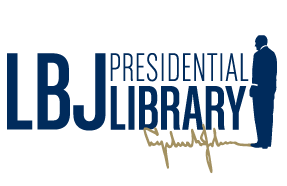
Image courtesy of the Lyndon Baines Johnson Library and Museum.
And Good Luck, Kid!
Artifact ID1973.291.1
Object Type
Cartoon Clipping
Artist
Draper Hill
Gifter
Draper Hill
Date
ca. December 1969
Medium
Paper
DimensionsOverall H 12 3/4 in x W 10 7/8 in (32.4 cm x 27.6 cm )
Physical DescriptionPhysical DescriptionNewspaper clipping of cartoon drawing. An old man with a robe, scythe, and hourglass passes a yo-yo with the world map to a baby ("The Seventies"). The faces of LBJ, Hubert Humphrey, Richard Nixon, and other people (identifiable as Charles de Gaulle, Ho Chi Minh, Bobby Kennedy, Nikita Khrushchev, Spiro Agnew, Edmund S. Muskie, Ed Sullivan, and others) as well as a robot, a crowd holding a peace sign, and man in a spacesuit are in the sky Caption: “...and good luck, kid!” Artist signature lower right: “Draper Hill”.
Inscriptions and MarkingsPrinted at upper left: [red] “Sunday”. Printed at upper left: “Feature Parade” “Worcester Sunday Telegram / Dec. 28, 1969”.
Historical NoteThis cartoon depicts many people and events of the late 1960s including the presidents Lyndon Baines Johnson and Richard Nixon, as well as other world leaders such as Charles de Gaulle, Nikita Khrushchev, and Ho Chi Minh, representing different world conflicts. In 1966, Charles de Gaulle withdrew France from NATO because he believed that NATO advantaged the relationship between the United States and the United Kingdom over France and he wanted France to have its own nuclear power and pursue detente with the Soviet Union. During the Johnson administration and general postwar era, much foreign policy was dictated by the Cold War, the rivalry between the United States and the Soviet Union for political influence amidst decolonization, associated with proxy wars, ideological struggles, the nuclear arms race, and the space race. In 1964, China detonated its first atomic bomb, leading to a third power to rival the other two. The Sino-Soviet split were the tensions between China and the Soviet Union during the Cold War. Although both nations were Communist, they competed with each other over the same spheres of influence. As a result, the United States had to practice triangular diplomacy to maintain relations with both Communist powers. In August 1964, US ships were seemingly attacked in the Gulf of Tonkin, leading to the Gulf of Tonkin Resolution that allowed President Johnson to take military action. In February 1965, Johnson authorized Operation Rolling Thunder to bomb North Vietnam. Over 1965, President Johnson escalated the conflict to a full-scale war and over 1967, there were 500,000 American troops in Vietnam. On July 20, 1969, as a part of the Apollo 11 mission, Neil Armstrong was the first person to walk on the moon. Robert Kennedy was the Attorney General under his brother’s administration and became a New York senator during Johnson’s presidency. He disagreed with Johnson’s Vietnam policy and became a prominent war critic. Kennedy ran for president in 1968 as an anti-war Democratic candidate until his assassination in June 1968. The Antiwar Movement (1964-1973) emerged in response to the Vietnam War and included many activist groups such as the Students for a Democratic Society and the Yippies and used tactics such as mass demonstrations, sit-ins, teach-ins, and guerilla theater. The robot demonstrates the many technological advancements of the 1960s.Additional Details
Custodial History NoteThe item was a gift from the general public to President Johnson during his term in office. It was received by President Johnson, until the President donated it to the Lyndon B Johnson Presidential Library in 1973.
Credit LineGift of Lyndon Baines Johnson
National Archives Catalog CollectionLyndon B. Johnson Library Museum Collection (National Archives Identifier 192413)
National Archives Catalog SeriesGifts from the General Public (National Archives Identifier 189698395)
Use Restriction StatusRestricted - Fully
Use Restriction NoteCopyright or other proprietary rights are held by individuals or entities other than the LBJ Presidential Library and Museum. The LBJ Presidential Library and Museum does not warrant that the use of materials will not infringe on the rights of third parties holding the rights to these works, or make any representations or warranties with respect to the application or terms of any international agreement, treaty, or protections that may apply. It is your responsibility to determine and satisfy any copyright or other use restrictions. Pertinent regulations can be found at 36 C.F.R 1254.62.
Person Referenced
Nikita Khrushchev
(Soviet Union, 1894 - 1971)
Person Referenced
Lyndon Baines Johnson
(United States, 1908 - 1973)
Person Referenced
Charles de Gaulle
(France, 1890 - 1970)
Person Referenced
Richard Nixon
(United States, 1913 - 1994)
Person Referenced
Hubert H. Humphrey
(United States, 1911 - 1978)
Person Referenced
Ho Chi Minh
(Vietnam, 1890 - 1969)
Person Referenced
Robert F. Kennedy
(United States, 1925 - 1968)
Person Referenced
Spiro Agnew
(United States, 1918 - 1996)
Person Referenced
Ed Sullivan
Person Referenced
Edmund S. Muskie
(United States, 1914 - 1996)
In Collection(s)
Not on view
Subjects
Place of Publication
Related Links

